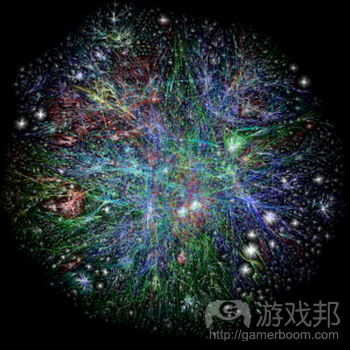社区元素是社交游戏制胜法宝
作者:Justin Nearing
之前我曾说到《黑手党战争》是款借助社区的游戏。本文将深入探究如何充分发挥社区元素,这是社交游戏尚未充分利用的工具。
社交游戏同社区元素密不可分
多数游戏,甚至是社交游戏,都着眼于玩家互动机制。这非常重要,因为开发商能够向同原始玩家相关的用户提供游戏内容。但建立能让玩家组成社区的机制是培养长期玩家的核心途径。
社区长久以来就是社交网络核心组成元素(游戏邦注:从研究角度看)。玩家群体便利性是社交网络成功与否最有力的说明。多数社交游戏都是个社交网络(能够充分利用现有社交网络,就像Facebook游戏),所以从理论上看,创造和维持社区型游戏将会成为长久成功作品。
游戏要想获得长久成功,社区要素非常重要。在多数情况下,对游戏本身不再感兴趣的用户也会继续玩游戏,这样他们才能继续同好友互动。社区促使玩家继续投身其中,即便新鲜感消失。
在游戏中融入社区因素
Facebook如今已提供游戏之外的社区,在这些社区中玩家能够私下分享游戏道具,完成请求,进行互动。但若一开始就在游戏中融入社区元素,开发商就拥有留住用户的强大渠道。这同时也能够带来许多有趣设计,只要社区成为游戏核心内容。随着开发商深入了解营收和病毒式传播渠道,“融入”这些功能将显得参差不齐,会损及游戏。
所以从一开始就借助社区元素非常重要。但我们该怎么做?
——用户能够从属多少个社区?
——参与一个社区与参与多个社区所产生的结果大不相同。开发商向用户提供系列“免费”社区,但若要加入更多社区,就需付费,以此实现创收。
——你怎么处理社区控制权/层级制度?
——合理处理社区控制权和层级制度非常重要。例如,定义社区中能够批准新成员加入的人员。谁能够移除社区成员?社区所有者拥有什么权利?管理人员拥有什么权利?社区控制权会影响其等级制度。等级制度应由用户决定。
——给予用户尽可能多控制工具。开发商希望给予用户权利意识,享有滥用此权利的自由。
——社区元素如何直接影响游戏?
——社区要想成为游戏核心内容,就需直接影响游戏。多数社交游戏都设有管理城市、农场,或某商业活动的独立用户。从根本上看,游戏是玩家控制下的微观经济。在经济中融入社区元素将创造一个由社区控制的宏观经济。
——宏观层面的资源和资金分享更加复杂(游戏邦注:资源价值具有动态性,取决于社区资源供求,若开发商融入互动交易,资源价值将变得更加复杂)。但这无疑能够促使经济更具社交性,因为开发商需能够同其他人员合作,方能实现收益最大化。
社区分歧因素
但为什么要创建社区?什么促使社区更具社交性?
社区群体就是进行日常互动的玩家。通过网络进行互动的玩家会融入某种氛围当中。用户将产生分歧,在互联网中,所有分歧都有可能演变成全面战争。这种气氛极具吸引力,玩家会重返游戏(即便他们如今未在游戏中开展任何活动),只是为了看看好友是否回应他们发布的上个帖子。
若开发商在游戏中融入社区元素(游戏邦注:其中用户能够轻松离开和进入游戏),分歧将会直接影响游戏活动。例如,若干社区成员不同意群主所做决定。随着分歧的升级,反抗成员就会离开社区,创建自己的群体。若两个群体相互对立?那么开发商就能够提供基于团体互动的游戏机制,这是促使社区玩家继续体验的强大动力。
基于社区的游戏
在游戏中融入社区是个有力刺激因素。它直接扩大游戏社区,把社区当作一个游戏功能。社交游戏关乎玩家社区,所以尽可能融入此元素是游戏一大制胜筹码。(本文为游戏邦/gamerboom.com编译,如需转载请联系:游戏邦)
The (Unused) Social Games Secret Weapon
by Justin Nearing
In previous posts I defined “Social Media” as a product that leverages its community. In this post I’ll go a bit deeper into how to leverage a community, and how this is a severely underutilized tool in social games.
IT’S ALL ABOUT GROUPS
The vast majority of games out there, even social games, are centered on providing gameplay on a player-to-player basis. This is absolutely important, as providing content to the individual is critical to that individual ever playing your game in the first place. However, building a system that allows users to form groups with each-other can be a critical step to inspiring long-term players.
Groups have long since been held (at a research/academic viewpoint) as a core part of social networks. In particular, the ease of creating user-defined groups is a strong indicator of how successful a social network will be. Most social game are a social network (ones that may leverage an existing social network, like games on Facebook), so logically a game with built in hooks to create and maintain groups is going to help the long-term success of your game.
These groups are so important for long term success of a game. In more than a few cases, a user who is not as interested in the game itself anymore will continue playing just so they can continue to interact with their friends. That is a huge statement- groups inspire people to continue to invest in your product even after the novelty of the game wears off.
BAKE GROUPS INTO YOUR GAME
Facebook already provides groups outside of games, where users can privately share game items, fulfill requests, and interact with eachother. However, if groups are baked into your game from the very beginning, you have a very powerful channel for retaining users. It also allows for some very interesting design possibilities- as long as its implemented as a core part of the game. As developers have learned with monetization and virality, “tacking-on” these features can look slip-shod and actually hurt your game.
So implementing groups from the very beginning is important. But how would we do it?
When thinking about groups, you have to deal with some questions.
- How many groups can a user belong to?
- Being allowed into one group will affect your game differently from an unlimited amount of groups. You could monetize this by having a number of “free” groups the user can be a part of, but have to pay to join additional groups.
- How do you deal with group control/hierarchy?
- Properly handling group control and hierarchy is very important. For instance, defining who in the group can allow new members to join. Who can kick members of the group? What powers does the groups owner have? What powers do officers have? Control of the group affects group hierarchy, and you want to have the hierarchy defined by the user.
- Give the user as many tools of control as possible, you want to give people a real sense of having power, and the ability to abuse that power (creates drama, we’ll get to that).
- How do groups directly affect the game?
- In order for groups to be core components of a game, they have to directly affect the game. Most social games have an individual user in control of a city, or a farm, or some kind of business. Basically, the game is a micro-economy controlled by the user. Plugging a group feature into the economy creates a macro-economy controlled by the group.
- Sharing resources and funds on a macro level is a lot more complicated (resource value becomes dynamic, based on the supply and demand of the resource in the group, gets even more complicated if you have group-to-group trading). However, it also makes this economy infinitely more social, as you have to coordinate with other people in order to maximize your profit.
FUEL THE FLAMES
But why create groups at all? What makes groups so much more social?
Groups are basically people interacting with eachother on a day to day basis. The thing with people interacting on the internet is that pretty quickly some drama is going to start. People will disagree with eachother, and this being the internet, the possibility of a disagreement turning into full-out war is likely. This kind of drama is so compelling for people- they will come back to the game (even if they can’t do anything else in the game today) just to see if buddy has replied to their last post declaring them an idiot.
If you have a grouping feature baked into your game, where users can easily join and leave groups, these disagreements can be leveraged to directly affect the game. For instance, say a number of group members disagree with a decision made by the group owner. The disagreement escalates, and the rebel users leave the group to create their own. Two groups that hate eachother? Now you can provide gameplay on a group-to-group basis, which is a very powerful motivator for the players of both groups to keep playing.
COMMUNITY DESIGNED GAMEPLAY
Having groups in a game can be a very powerful motivator. It directly grows an in-game community, and incorporates that community as a game feature. Since social games are all about the community of users playing, so it’s a no-brainer that tapping into this as much as possible will be a huge win for your game.(Source:gamasutra)








































 闽公网安备35020302001549号
闽公网安备35020302001549号